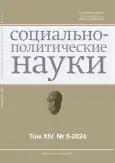Features of domestic and foreign criteria and indicators for evaluating the effectiveness of social mechanisms for building trust in economic relations (using the example of the discourse of international forums and statements by top officials of states)
- Авторлар: Shikhgafizov P.S.1, Borichevskaya E.I.1, Kolenkina P.D.1
-
Мекемелер:
- Financial University under the Government of the Russian Federation
- Шығарылым: Том 14, № 5 (2024)
- Беттер: 133-142
- Бөлім: Theory, Methodology, and History of Sociology
- URL: https://journals.eco-vector.com/2223-0092/article/view/655526
- DOI: https://doi.org/10.33693/2223-0092-2024-14-5-133-142
- EDN: https://elibrary.ru/RYESJX
- ID: 655526
Дәйексөз келтіру
Аннотация
The purpose of the study. The article discusses indicators and indicators that determine the effectiveness of social mechanisms for building trust in economic relations, within the framework of research “Social mechanisms for building trust in transforming economic relations”. At the beginning of the work, the principles, rules and tools for building trust relations in the economy are considered on the example of the discourse of international forums and statements by top officials of states. At the same time, it is noted that in domestic politics, top officials of states recommend managers to use digital technologies to build trust, for example, during the electoral process. The criteria and indicators of trust in economic relations are analyzed, which stimulates the economic development of society, improves the interaction of market participants and contributes to the general well-being of society. As various studies show, today the following general criteria of trust can be distinguished in domestic and foreign practice: reliability of an individual, organization, state; the development of the individual and the organization; the absence of deception; goodwill; understanding and respect for the feelings of partners; fulfillment of promises for further cooperation.
Conclusions. Based on the conducted research, the criteria and indicators that determine the features of trust formation in economic relations have been identified. The authors conclude that in an unstable and nonlinearly expanding society, a universal way to assess the effectiveness of trust-building mechanisms is necessary. As such a method, a universal technology can be proposed, which is implemented at the institutional and personalistic levels and involves considering criteria and indicators formed at the intersection of information-reflective, value-normative, communication-interpretative and activity mechanisms in one social field.
Негізгі сөздер
Толық мәтін
Авторлар туралы
Pirmagomed Shikhgafizov
Financial University under the Government of the Russian Federation
Хат алмасуға жауапты Автор.
Email: psshikhgafizov@fa.ru
ORCID iD: 0000-0002-9154-8877
Cand. Sci. (Sociol.), Associate Professor, leader researcher, Institute of Humanitarian Technologies and Social Engineering, deputy Head, Department of Sociology, Faculty of Social Sciences and Mass Communications
Ресей, MoscowElizaveta Borichevskaya
Financial University under the Government of the Russian Federation
Email: eiborichevskaya@fa.ru
ORCID iD: 0000-0001-7116-4035
junior researcher, Institute of Humanitarian Technologies and Social Engineering, assistant, Department of Sociology, Faculty of Social Sciences and Mass Communications
Ресей, MoscowPolina Kolenkina
Financial University under the Government of the Russian Federation
Email: PDKolenkina@fa.ru
intern researcher, Institute of Humanitarian Technologies and Social Engineering, Faculty of Social Sciences and Mass Communications
Ресей, MoscowӘдебиет тізімі
- Nenasheva A.V. Trust in the media in modern Russia. Dis. ... Cand. Sci. (Polit.). St. Petersburg, 2018. 334 p.
- Khusainova A.I. Institutional foundations of the formation of trust in money. Dis. ... Cand. Sci. (Econ.). Ufa, 2021. 191 p.
- Jiru Challa Amdissa et al. Public engagement for improving the relationship between the people and the parliament. Public Administration in Ethiopia: Case Studies and Lessons for Sustainable Development. Bacha Kebede Debela et al. (eds.). Leuven University Press, 2020. Pp. 113–138.
- Granovetter M. Trust in the economy. Society and Economy: Framework and Principles. Harvard University Press, 2017. Pp. 56–90.
- Parigi P., Cook K. Trust and relationships in the sharing economy. Contexts. 2015. Vol. 14. No. 1. Pp. 18–19.
- Drutman L. et al. In the wake of its COVID-19 failure, how do we restore trust in government? In: Democracy Beyond COVID-19: The politics of crisis policymaking. New America, 2020. Pp. 24–27.
- Thomas M.A. Time for a counter-AI strategy. Strategic Studies Quarterly. 2020. Vol. 14. No. 1. Pp. 3–8.
Қосымша файлдар










